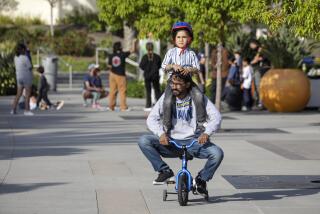Sheik’s Son May Be 1st to Face Tribunal
- Share via
WASHINGTON — Vice President Dick Cheney said Friday that the captured son of an imprisoned sheik could be among the first to face trial by military tribunal, as the allied effort in Afghanistan increasingly focuses on the painstaking task of identifying key figures in a swelling population of Taliban prisoners.
Cheney confirmed that allies have detained Ahmed Omar Abdel Rahman, a high-profile figure in Osama bin Laden’s Al Qaeda terrorism network and the son of a Muslim cleric convicted in 1995 of conspiring to blow up a series of New York landmarks.
“Right now, [Rahman] is being held by the Northern Alliance,” Cheney said in an interview on ABC’s “Good Morning America,” adding that Rahman is a prime candidate for President Bush’s plan to try international terrorism suspects before military tribunals rather than in civilian courts.
“Clearly, a high-ranking Al Qaeda official captured in Afghanistan . . . is exactly the kind of individual that the tribunals were established for,” Cheney said.
Rahman is considered the most significant Al Qaeda member captured in the Afghan campaign and is believed to have played a prominent recruiting role for the network.
Rahman’s emerging case provides a glimpse into the allies’ daunting task of singling out key figures in a population of Taliban and Al Qaeda prisoners that now numbers in the thousands.
An attorney for the Rahman family in Egypt told reporters that Rahman was captured Nov. 8 fleeing the Afghan capital, Kabul. The attorney, Muntasir Zayyat, said he had been able to spot his client among a line of shackled prisoners in recent television news coverage.
But U.S. intelligence officials, working with Northern Alliance captors, apparently identified Rahman just this week. Defense Secretary Donald H. Rumsfeld acknowledged Friday that identifying high-profile prisoners is a laborious process.
The Northern Alliance has “thousands of people in a variety of locations spread across Afghanistan,” Rumsfeld said. “They are people who, for the most part, don’t walk up and volunteer their names and identification numbers with a sample of DNA. What they do is blend into the other prisoners.”
Sorting through this population also exposes U.S. service members and intelligence operatives to enormous risk. The only American killed in action so far was a CIA officer, Johnny “Mike” Spann, who was part of a clandestine team interrogating prisoners at a 19th century compound near the northern city of Mazar-i-Sharif. He was killed Sunday in a bloody uprising by captured Taliban soldiers.
Pentagon officials said Friday that they are eager to question new Taliban defectors. Former Taliban intelligence chief Qari Ahmadulla is believed by some to be among them, but Pentagon officials said Ahmadulla was still negotiating his surrender in Kandahar, the southern stronghold that is the Taliban’s spiritual capital.
Associated Press, citing a Pentagon-compiled list of key Taliban and Al Qaeda operatives whom the U.S. hopes to interrogate, reported that seven Al Qaeda leaders and senior aides on the list are believed dead. Of the more than three dozen Taliban members the Pentagon has on its list, about 12 have been killed or injured or have defected, the news service said.
Pentagon officials stressed that U.S. forces have not formally taken custody of any prisoners. But Rumsfeld made it clear that the United States and anti-Taliban forces are working in lock-step.
During a briefing at the Pentagon on Friday, he went into considerable detail about how much food, clothing, ammunition and tactical support the United States has provided its allies, and he said U.S. military personnel are embedded in anti-Taliban units.
“You can be certain that in the event we find someone we want, that we will have the authority to receive them,” Rumsfeld said.
Terrorism experts said Rahman could possess a wealth of intelligence but were skeptical that he could be persuaded to talk.
“He was one of the people who had contact with the recruiters on the ground in various countries,” said Vince Cannistraro, former chief of CIA counter-terrorism operations. “He may be able to point to the existence of cells and people abroad if he’s willing to cooperate.”
Allies could put pressure on Rahman by threatening to leave him “in the kind hands of the Northern Alliance,” Cannistraro said. “But I don’t think that’s a major point of leverage over him. He’s a true believer.”
Bush administration officials have described Rahman as a member of the top Al Qaeda hierarchy. He has been showcased in recruiting materials by network operatives eager to take advantage of the influence exerted by his father, Sheik Omar Abdel Rahman, among Muslim extremists.
The sheik, who lost his eyesight to diabetes, founded a radical Islamic group in Egypt in the 1970s and has repeatedly urged followers to wage holy war, or jihad, against America, terrorism experts say.
The sheik, who is being held at a federal medical center near Rochester, Minn., was convicted for his role in a 1993 plot to bomb New York targets, including the United Nations headquarters, the George Washington Bridge and the Lincoln Tunnel. He is prevented from communicating with followers but has come to be regarded as a martyr among many extremists.
Bin Laden has referred to the sheik as an American “hostage” and vowed in a video to use his terrorist network to liberate him. At Bin Laden’s side in the video was the younger Rahman, said Juliette Kayyem, a terrorism expert at Harvard University.
Some fear that the Rahman family’s influence could be amplified if the sheik’s son is also imprisoned, especially if he is convicted by a military court.
“The same people who viewed the imprisonment of his father with suspicion will also view his trial in a military court even more so,” said Kayyem, a former member of the National Commission on Terrorism. “It will be viewed as being unfair. At least the father had an open trial and was convicted and sentenced based on a jury trial.”
Rahman has an older brother, Mohammed, who is also believed to be a top Al Qaeda operative in Afghanistan.
*
Times staff writer Josh Meyer contributed to this report.
More to Read
Sign up for Essential California
The most important California stories and recommendations in your inbox every morning.
You may occasionally receive promotional content from the Los Angeles Times.










